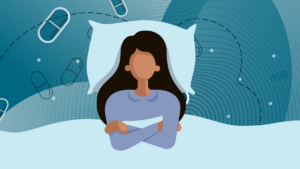Title: Understanding Sleep Disorders as a Public Health Concern
Introduction
With the ever-increasing demands on our time and attention in today’s fast-paced culture, sleep problems have become a major public health issue that impact millions of people worldwide. Sleep disorders are a broad category that include anything from narcolepsy and restless legs syndrome to insomnia and sleep apnea. These problems impair both the quantity and quality of sleep, which can have serious repercussions on one’s physical, mental, and emotional health. We shall examine the several causes of sleep disturbances in this article and discuss the importance of treating them for the general public’s health.
Understanding Sleep Disorders:
The inability to get asleep, stay asleep, or obtain restorative sleep is referred to as a sleep disorder. These issues can lead to daily tiredness, irritability, and poor cognitive performance. Numerous variables, such as physical illnesses, lifestyle choices, environmental effects, and psychological problems, might contribute to these diseases. Among the most prevalent sleep disorders are:
•Insomnia: The inability to fall asleep, stay asleep, or wake up too early and not be able to go back to sleep are the symptoms of insomnia. Stress, anxiety, sadness, irregular sleeping patterns, and underlying medical issues are some of the causes.
•Sleep Apnea: Breathing regularly stops and begins as you sleep, a condition known as sleep apnea. It is a potentially dangerous sleep disorder. Loud snoring, sleep disturbances, and excessive daytime tiredness might result from it. The most prevalent kind of sleep apnea, called obstructive sleep apnea, is caused by excessive throat muscular relaxation that blocks the airway.
•Restless Legs Syndrome (RLS): The neurological condition known as restless legs syndrome (RLS) is characterized by painful leg sensations that are frequently described as creeping, crawling, or tingling. Usually during times of rest or inactivity, these feelings cause an overwhelming need to move the legs.
•Narcolepsy: The symptoms of narcolepsy, a chronic neurological condition, include extreme daytime sleepiness, irregular sleep patterns, and abrupt episodes of muscular weakness or paralysis (cataplexy). It can seriously lower one’s quality of life and ability to go about everyday tasks.
•Shift Work Sleep Disorder: This condition is brought on by people who work irregular hours and have trouble falling or being awake when they need to. Sleep disturbances that interfere with the body’s circadian cycle can result in insomnia, excessive tiredness, and reduced attentiveness.
The Effects of Sleep Disorders on Public Health:
Sleep disturbances have far-reaching effects that go beyond personal relationships and have an overall influence on public health. The following are a few ways that sleep disturbances affect issues related to public health:
•Reduced Cognitive Function: Learning, memory consolidation, and cognitive function all depend on getting enough sleep. Sleep disturbances have the potential to negatively impact cognitive function, attention span, and decision-making skills, which raises the possibility of mishaps, mistakes, and injuries in a variety of contexts, such as the job, classrooms, and driving.
•Reduced Productivity: Sleep disturbances have a big effect on how well people work and how productive they are at work. People who suffer from sleep difficulties may find it difficult to focus, stay motivated, or be creative, which can result in lower productivity, absenteeism, and presenteeism (showing up to work but not contributing completely).
•Increased Risk of Chronic Health issues: Untreated sleep problems and prolonged sleep deprivation have been linked to a higher risk of acquiring a number of chronic health issues, such as diabetes, obesity, heart disease, and stroke. In consequence, these illnesses put a burden on healthcare systems and raise healthcare expenses.
•Implications for Mental Health: Substance addiction problems, depression, and anxiety are among the mental health issues that are strongly associated with sleep disturbances. Inadequate sleep, both in terms of quality and quantity, can aggravate mental health symptoms and set off a downward spiral in which mental health consequences get worse.
•Impact on Quality of Life: Lack of sleep can have a serious negative impact on a person’s quality of life, which lowers general satisfaction and well-being. Relationships, social contacts, and leisure activities can be challenging for people with sleep problems, which exacerbates feelings of loneliness and discomfort.
•Economic Burden: Because of medical expenses, missed work, and reduced quality of life, sleep disorders place a heavy financial strain on society. The entire economic effect is influenced by the expenses related to the diagnosis, treatment, and management of sleep disorders as well as the indirect costs resulting from accidents, disability, and absenteeism.
Prioritizing the Treatment of Sleep Disorders in Public Health:
It is critical to give priority to addressing sleep problems and promoting healthy sleep habits because of the substantial consequences these conditions have for public health. The following are some methods for making sleep problems a top concern for public health:
•Raise Awareness: Raising awareness and lowering stigma requires educating the general public, medical professionals, employers, and legislators about the value of sleep, as well as the frequency and effects of sleep disorders.
•Enhance Screening and Treatment Accessibility: Improving sleep problem screening, diagnostic, and treatment accessibility can aid in identifying high-risk folks and guarantee prompt intervention and management. This might entail lowering obstacles to seeing a sleep expert, increasing telemedicine alternatives, and incorporating sleep health into primary care settings.
•Encourage Healthy Sleeping Habits: Sleep hygiene, or the promotion of healthy sleeping habits and behaviors, is essential to the prevention and treatment of sleep disorders. This include adhering to a consistent sleep schedule, setting up a cozy sleeping space, avoiding gadgets and caffeine just before bed, and engaging in relaxation exercises.
•Encourage Workplace Interventions: Employers have a critical role to play in helping employees with sleep problems and in developing good sleep habits. This might entail putting in place flexible work hours, delivering workplace wellness initiatives that deal with weariness and stress management, and educating people about the benefits of good sleep.
•Promote Research and Innovation: To increase understanding and improve results, more research is needed to determine the underlying causes, processes, and therapies of sleep disorders. Putting money into sleep research and innovation can result in the creation of novel treatments, technological solutions, and therapies for problems relating to sleep.
Conclusion:
Sleep disorders are a serious public health concern that have an impact on people individually, in groups, and across entire societies. The effects of sleep problems go beyond the area of sleep itself, including reduced productivity, diminished cognitive function, and an increased risk of mental illness and chronic health diseases. We can work toward addressing these problems and promoting better sleep health for everyone by designating sleep disorders as a public health priority and putting strategies into place to increase awareness, improve access to screening and treatment, encourage healthy sleep habits, and support workplace interventions.




























